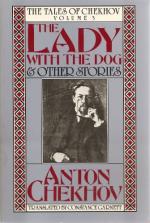|
This section contains 5,158 words (approx. 18 pages at 300 words per page) |

|
SOURCE: "Chekhov's Last Years: His Approach to Drama," in Chekhov: A Biographical and Critical Study, George Allen & Unwin, 1966, pp. 219-44.
In the following excerpt from a work that was first published in 1950, Hingley examines the essential characteristics of Chekhovian drama.
Chekhov was admirably fitted to become the leading dramatist of the Moscow Art Theatre because he thoroughly agreed with Nemirovich-Danchenko and Stanislavsky in wanting to get away from the conventions and atmosphere of the existing Russian stage. His four major plays—The Seagull, Uncle Vanya, Three Sisters and The Cherry Orchard—mark a break with tradition so startling that many critics call him a 'revolutionary' dramatist. In defining the revolution which he accomplished it is impossible to avoid paradoxical language—he is frequently said to have 'purged the theatre of theatricality', to have written 'undramatic drama' and 'tragedies, the essence of which consists in the absence of tragedy'...
|
This section contains 5,158 words (approx. 18 pages at 300 words per page) |

|


